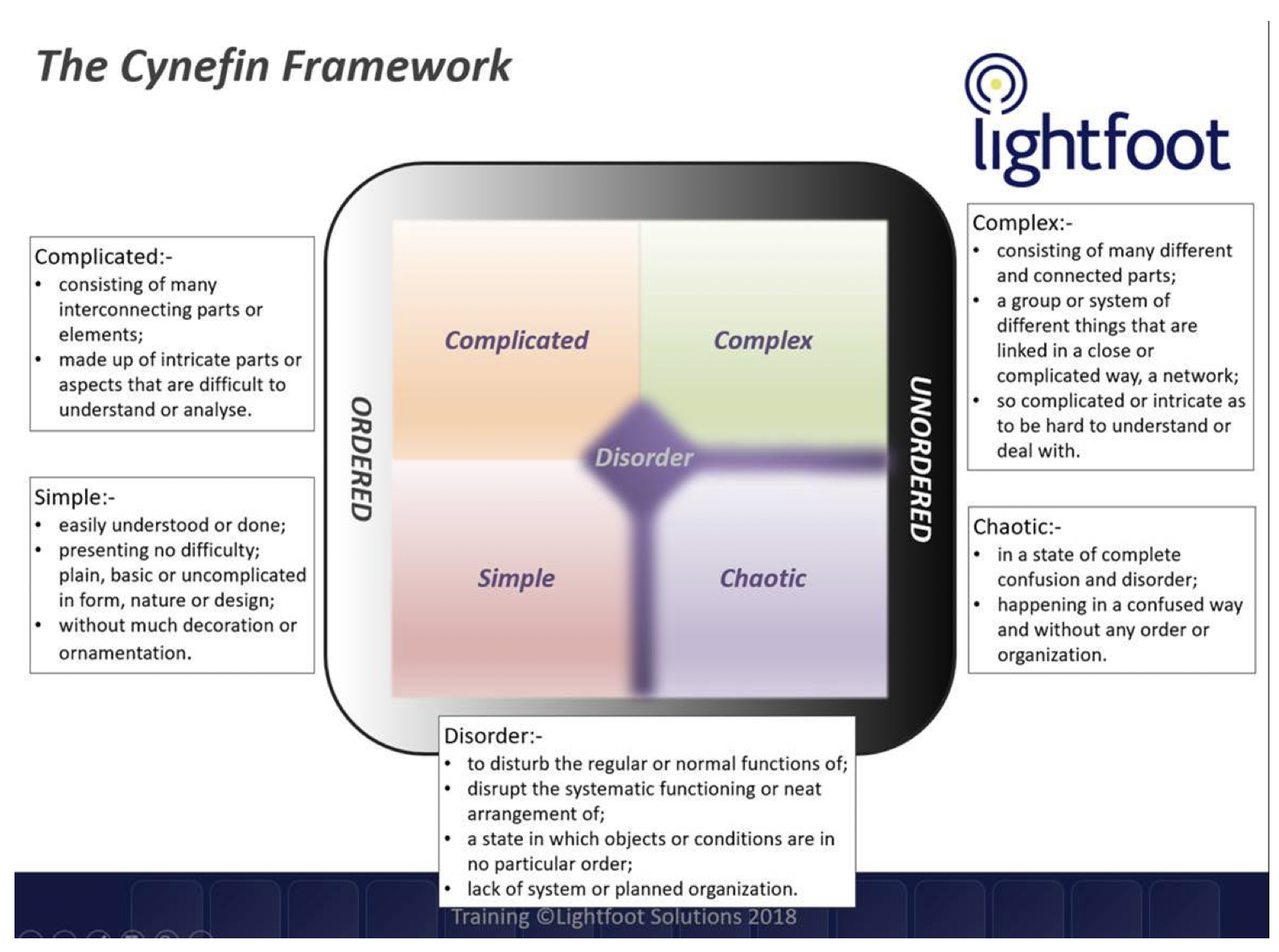“Computer says ‘So’ – Innovation and Cynefin” – first of four on this subject
18/02/2019

Some of you will remember the famous sketch in the TV series, Little Britain, where the “Computer Says No” to a prospective customer, and the frustrating time that person has in understanding why!
Well, with today’s bright and shiny “Innovative Solutions” employing so-called “Big Data” and “Artificial Intelligence” the real danger is that a user of such tools will be directed to carry out some action, and when questioned, possibly in court, the only response they’ll be able to give is “I had to do it because The Computer Says So”!
In our last blog, we looked at “Thinking Differently (and understanding)” vs “Doing Differently (without understanding)”. I’ve heard many senior executives and busy managers say, “I don’t have time to understand, just give me three alternatives, and I’ll pick one”. Presumably, the ability to pick the right one, or even to know they’re the right three in the first place, increases as one ascends the corporate ladder? Just why are these senior people so busy? We’ll look at that in a future blog.
In the previous blog, we touched on the Cynefin Framework – IBM being cited as the originator of this concept. It is a framework for understanding – understanding what type of Environment your business is operating in, and the type of Business Systems, Processes or Stages working in such Environments. It provides an understanding of which Approaches, Techniques and Tools work best in each Environment and which do not.
Apparently, Cynefin is pronounced ku-NEV-in, and is a Welsh word that signifies “the multiple factors in our environment and our experience that influence us in ways we can never fully understand.”
With the help of Bill Dettmer (Goal Systems International), we’ve developed this framework beyond its initial inception to cater for how we have seen things working in our customers’ situations. It is work in progress. Rather than explaining the structure in detail here, we’ll briefly try to bring this framework to life through some examples to highlight the 4 main Environments / Systems – let’s call them Domains – represented by the 4 boxes below.

And we’ll refer back to a previous blog where we introduced the term VUCA (Volatile, Uncertain, Complex and Ambiguous), see
We’ll use a “VUCA Score” to help determine which Domain we’re in, as sometimes it may be difficult to determine where we are.
We’ll just cover the Simple Domain in this first of four blogs, then work our way around to the rather special and exciting Chaotic Domain in subsequent blogs:
Simple Domain (Volatility = Low; Uncertainty = Low; Complexity = Low; Ambiguity = Low): For example, taking a call from a customer to change an insurance policy, or taking a call from a member of the public and passing on to the control room for despatch. Each of these is a relatively Simple Environment, with relatively low variability and low uncertainty, that can be catered for by relatively Simple Business Stages (that may be part of a potentially more Complicated Business Process or System).
Almost all good management techniques and tools work well here, and include Lean, 6-Sigma, SPC, Cause & Effect, Correlation Analysis, Logical Thinking Process, Boyd’s OODA Loop, and it is straightforward to predict forward as to what to expect in the future, and so on. Common Practice (some would call it Best Practice) can be applied derived from a common understanding of the Domain.
But note, even a Simple Domain can fall into the frenzied area labelled Disorder. For example, if you’ve planned on a certain number of resources for, say, an Environment where there are 1,000 calls per hour spread evenly over that hour, and suddenly you get 1,000 calls in 10 minutes, or 10,000 calls an hour over a few days, the Business System or Process you’ve set up will not cope and go into Disorder as callers hang up and call again or use other means to contact you. Often, the Disorder in the Environment only lasts for a few minutes or hours, possibly days, but eventually reverts back, and the System recovers and eventually carries on operating as normal.
…. Next time, we’ll take a look at the Complicated Domain ….
…. But in the meantime, what would be very dangerous is if we come to rely on some of the emerging innovations and, in the final analysis, we can only say, ”We did it because The Computer Says So!”.
Categories & Tags:
Leave a comment on this post:
You might also like…
Company codes – CUSIP, SEDOL, ISIN…. What do they mean and how can you use them in our Library resources?
As you use our many finance resources, you will probably notice unique company identifiers which may be codes or symbols. It is worth spending some time getting to know what these are and which resources ...
Supporting careers in defence through specialist education
As a materials engineer by background, I have always been drawn to fields where technical expertise directly shapes real‑world outcomes. Few sectors exemplify this better than defence. Engineering careers in defence sit at the ...
What being a woman in STEM means to me
STEM is both a way of thinking and a practical toolkit. It sharpens reasoning and equips us to turn ideas into solutions with measurable impact. For me, STEM has never been only about acquiring ...
A woman’s experience in environmental science within defence
When I stepped into the gates of the Defence Academy it was the 30th September 2019. I did not know at the time that this would be the beginning of a long journey as ...
Working on your group project? We can help!
When undertaking a group project, typically you'll need to investigate a topic, decide on a methodology for your investigation, gather and collate information and data, share your findings with each other, and then formally report ...
From passion to purpose: My journey at the Pinnacle of Aviation
By: Sultana Yassin Abdi MSc Air Transport Management, Current Student Born and raised in the vibrant landscape of the UAE, with roots stretching back to Somalia, my life has always been ...






